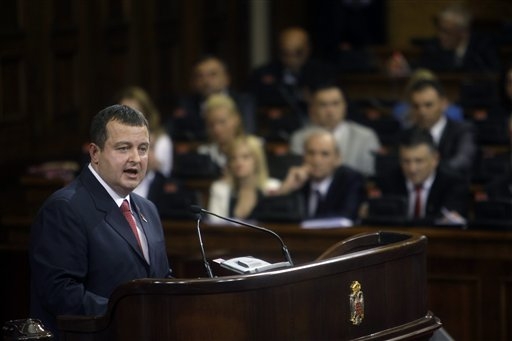
BELGRADE, Serbia (AP) — As Serbia's parliament prepared to elect Ivica Dacic as prime minister, the former wartime spokesman for Slobodan Milosevic tried to dispel concern that his government could push this country back into the nationalism of the late strongman's era.
Ivica Dacic — who had earned the nickname "Little Sloba" in the past for his admiration of the former Yugoslav president — pledged once again in his speech to the lawmakers on Thursday that he would press on with Serbia's bid to join the European Union and promote peace and stability in the Balkans.
"There has been enough blood in the Balkans," Dacic said. "Serbia is offering its hand. Let us turn to the future and not deal with the past."
Dacic's coalition of parties in Parliament has the majority needed to elect him prime minister and to approve his Cabinet. This was initially expected to happen on Thursday night, but the vote was delayed until noon on Friday after parliamentary discussion continued into the early morning hours.
Not everyone was reassured by Dacic's speech.
In Kosovo, Serbia's former province which declared independence in 2008 following a bloody war, Foreign Minister Enver Hoxhaj described Dacic's ruling coalition as "antidemocratic and anti-European" and "rooted in the past."
"Still, it is the choice of the Serbian people," Hoxhaj said. "They are the ones who should worry if Serbia returns to its dark past or looks toward a European future."
Nenad Canak, an opposition lawmaker in the Serbian parliament, said: "Ours was no ordinary past that we can simply leave behind." Speaking to Dacic, he said: "You are talking about it as if the Balkan wars were a petty quarrel."
If Dacic and his Cabinet, which also includes President Tomislav Nikolic's nationalist party and several smaller groups, are sworn in on Friday, as expected, that will end nearly three months of political uncertainty that followed an inconclusive election on May 6.
Once elected, the new Cabinet will mark the first time Milosevic's nationalist allies have fully returned to power in Serbia since the former autocrat was ousted in a popular revolt in 2000 after a decade marked with wars, international sanctions and economic downturn.
Dacic and his coalition partners have strong ties with Russia and have suggested in the past that they would drop Serbia's EU bid if it means that the country has to give up its claim on Kosovo, whose independence Belgrade has refused to accept.
Djordje Vlajic, an editor at Radio Belgrade, said the democratic public in Serbia fears a return to Milosevic's autocratic era of the 1990s, but such a scenario is impossible and "no one would dare reignite tensions in the region." He said Dacic has changed "and built a pro-European image and he will seek to stick to that."
Vlajic warned, however, that "some elements (of war-era tensions) could return if the new ruling coalition does not send a clear message" that it has changed.
In his speech, Dacic insisted that "our goal is to speed up the process of EU integration." He said that the new authorities are ready to "immediately" continue the EU-brokered talks with Kosovo, which is a condition for Serbia's EU bid. "Serbia will not recognize Kosovo's independence," Dacic said. "But we will solve the issue of Kosovo peacefully and through dialogue."
Besides Dacic, the new government would include other prominent figures from the Milosevic era. Aleksandar Vucic — who would be in charge of defense and security in the new government — was Milosevic's former information minister, notorious for his extremist views during the 1998-99 Kosovo war.
Milosevic was widely blamed for instigating the conflict in the former Yugoslavia, which claimed more than 100,000 lives and left millions homeless. The former Serbian and Yugoslav leader was tried for genocide at the U.N. tribunal in The Hague, Netherlands, where he died before the trial ended.
Post-Milosevic authorities have since managed to restore Serbian ties with the world and boost regional reconciliation. The reformists have also arrested war criminals and made Serbia a candidate for EU entry, gaining support from the United States and its EU allies who have sought to stabilize the Balkans.
Dacic was a loyal disciple during the war and has evoked Milosevic's trademark defiance and populism even after forging an alliance with pro-Western Democrats in the previous government. However, Dacic ditched the Democrats after reformist leader Boris Tadic lost the presidential election to nationalist Nikolic.
Dacic then turned to Nikolic's nationalist Progressive Party for a coalition, reportedly with support from Russia.
Among the challenges facing the new government are widespread joblessness and a cash-strapped budget amid deepening economic crisis. The average salary in Serbia is around €350 ($429) per month, while poverty is widespread.